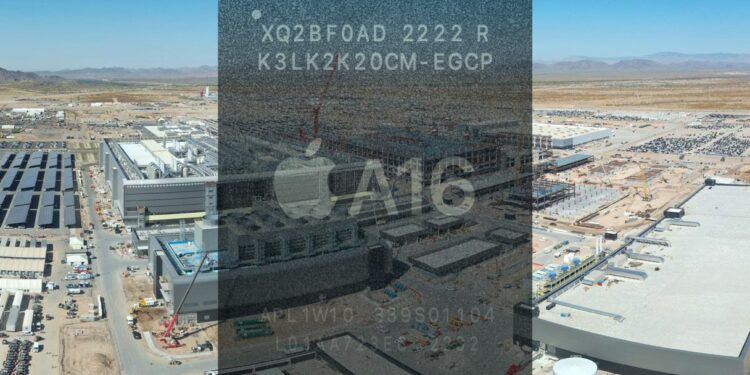The A16 processors were first used in the iPhone 14 Pro. Although we donŌĆÖt know much about AppleŌĆÖs plans with these chips, it might use them in upcoming iPads and/or iPhone SE.
The production has started in the first fabrication unit. The company plans to add two more fab units in Phoenix alone. However, the timelines for both of these have been pushed back.
The Taiwan Semiconductor Manufacturing Company (TSMC) Arizona fabrication facility is ready to roll and Apple will be its first big customer.
According to reports, the tech giantŌĆÖs A16 processors are being built using TSMCŌĆÖs 5nm technology. Although in small quantities, the production is already underway. TSMC plans to increase output after mid-2025, i.e., once the fabricationŌĆÖs second stage is completed.
About the Processor
The A16 Bionic processor came out two years ago with the iPhone 14 Pro ŌĆō it was then also used in the iPhone 15 series. The first sets were made in Taiwan using the N4P process, which is also known as the 4nm mode.
Here, it might get a little confusing for some of you because many people use 4nm and 5nm interchangeably. TSMC has clarified that itŌĆÖs all a part of the broader 5nm family of processes ŌĆō more like an enhanced version of 5nm. The bottom line, therefore, is that you can call it whatever you please.
Not much is known about which products might have these new ŌĆśMade in AmericaŌĆÖ chips. Our best guess is that the upcoming iPads (not the iPad Mini, as itŌĆÖs coming out this October) and iPhone SE might have the new Arizona-built A16 processors.
About TSMCŌĆÖs Arizona Venture
The fabrication in the unit in Arizona is part of a much bigger plan. TSMC plans to invest $65 billion in building three fabrication units across Phoenix that will use 4nm, 3nm, and 2nm processes to manufacture the finest quality of chips and processors the world has ever seen.
The construction of the first facility started 3 years ago, in 2021. Back then, the company had expected to release the first bulk of 4nm chips by 2024. However, multiple hurdles, such as the COVID-19 pandemic, cultural differences between Taiwan management and American employees, and delays in construction pushed this timeline to 2025.
The dates for the second fabrication facility have also been pushed back. The production was initially supposed to start in 2026. However, it now looks like production wonŌĆÖt start until 2027 or 2028. It all depends on customer demand, especially because the latest ŌĆśMade in AmericaŌĆÖ chips will be at least 30% costlier.
This project also received immense support from the U.S. governmentŌĆÖs CHIPS and Science Act ŌĆō a recently passed legislation that aims to help the US develop semiconductors domestically and reduce its reliance on Asia.
Intel and Its CHIPS Act Funding
Speaking on the CHIPS Act, thereŌĆÖs something else huge you should be aware of: Intel might miss out on its promised share of the CHIPS Act fund. The White House has allegedly delayed payments owing to the companyŌĆÖs poor performance.
In order to qualify for the funding, the company needs to go through stringent checks and meet the expectations that were initially promised. However, IntelŌĆÖs data center CPU and foundry businesses arenŌĆÖt performing as expected ŌĆō the company reported a massive $1.6 billion loss in the second quarter of 2024.
Addicting to its troubles, Intel announced layoffs affecting 15% of its workforce. On top of that, some of its shareholders sued it after its stock prices went down. All in all, itŌĆÖs a bad time for Intel, with the company struggling to survive.
What makes things even more complicated is that Intel was supposed to be the biggest beneficiary of this scheme. However, considering its financial woes, followed by TSMCŌĆÖs production launch and deal with Apple, is it possible that Intel might lose its spot to TSMC? Only time will tell, so stay tuned to find out.
Related: Intel shares surge 6% following plans to separate its AI chip manufacturing subsidiary
Our Editorial Process
The Tech Report editorial policy is centered on providing helpful, accurate content that offers real value to our readers. We only work with experienced writers who have specific knowledge in the topics they cover, including latest developments in technology, online privacy, cryptocurrencies, software, and more. Our editorial policy ensures that each topic is researched and curated by our in-house editors. We maintain rigorous journalistic standards, and every article is 100% written by real authors.
Source link : http://www.bing.com/news/apiclick.aspx?ref=FexRss&aid=&tid=66ec32f074f541739be5756bb592aa36&url=https%3A%2F%2Ftechreport.com%2Fnews%2Ftsmc-arizona-facility-manufacturing-apple-a16-processors%2F&c=10346368859775870696&mkt=en-us
Author :
Publish date : 2024-09-19 02:31:00
Copyright for syndicated content belongs to the linked Source.












